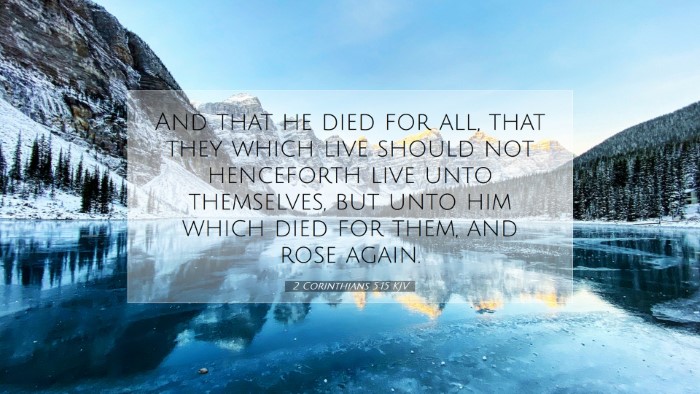Commentary on 2 Corinthians 5:15
Verse: "And he died for all, that they which live should not henceforth live unto themselves, but unto him which died for them, and rose again." (2 Corinthians 5:15)
Introduction
This verse serves as a profound statement on the purpose of Christ's sacrificial death and its implications for believers. The Apostle Paul emphasizes that the death of Christ was not merely a historical event but a transformative act with deep implications for all who believe. Matthew Henry, Albert Barnes, and Adam Clarke provide rich insights into the theological and practical ramifications of this verse.
Matthew Henry's Commentary
Christ's Death for All: Henry emphasizes that Christ's death was universal in its scope; it was intended for all humanity. His atoning sacrifice is sufficient for everyone, yet its efficacy applies specifically to those who believe. The necessity of faith becomes clear: it is through faith that individuals experience the benefits of Christ’s sacrifice.
Living for Christ: Henry notes that the purpose of Christ’s death is that those who now have new life in Him should no longer live for themselves. This selfless lifestyle is a hallmark of true Christian discipleship. The believer's life is to reflect Christ’s love and sacrifice, manifesting in service and dedication to God and others.
Albert Barnes' Commentary
The Atonement's Scope: Barnes points out that Paul’s assertion that Christ "died for all" indicates the inclusivity of the gospel message. This universality implies that every individual has the opportunity for salvation, but they must accept this gift. He highlights that Christ’s love compels believers to respond beyond mere personal salvation to a life of active faith.
Transformation of Life: Barnes elaborates on the transformation expected of believers. The phrase "should not henceforth live unto themselves" carries the idea of a radical change in orientation. This transformation is not merely external; it calls for a fundamental reorientation of priorities, wherein one’s life is lived in accordance with the teachings and example of Christ.
Adam Clarke's Commentary
Spiritual Awakening: Clarke interprets the central theme of the verse as a call to spiritual awakening. He emphasizes that the recognition of Christ's sacrifice should lead to a conscious decision to live for Him. This living "unto him" reflects a relationship that is both personal and communal, urging believers to participate actively in the mission of Christ.
The Resurrection's Significance: Clarke poignantly highlights that the mention of Christ's resurrection is critical. It signifies that Christ's death was not the end, but rather the beginning of new life. Believers are called to live in light of this resurrection, which imbues their existence with hope, purpose, and the knowledge of eternal life.
Theological Implications
- The Universality of Christ's Atonement: The assertion that Christ died for all speaks to the grace and love of God that knows no bounds.
- The Call to Discipleship: The transition from living for oneself to living for Christ highlights the cost of discipleship and the commitment required from believers.
- The Impact of the Resurrection: The resurrection serves as both a comfort and motivation, reminding believers of the power of new life and the hope that accompanies it.
Practical Applications
For pastors, students, theologians, and Bible scholars, understanding this verse offers several practical applications:
- Encouraging Evangelism: The universality of Christ’s death serves as a motivator for evangelistic efforts, reminding the church of its mission to share the gospel with all.
- Promoting Transformational Living: This verse challenges Christians to evaluate their lifestyles and priorities, urging them to live sacrificially for the sake of Christ.
- Fostering Community: Recognizing we live for Christ necessitates mutual support and accountability within the body of Christ, promoting a culture of love and service.
Conclusion
2 Corinthians 5:15 encapsulates the essence of the Christian faith—a life transformed through the recognition of Christ’s sacrificial love. As believers reflect on this truth, they are called to live out their faith in vibrant and meaningful ways, impacting their communities and honoring the One who died for them and rose again.


